Project manager vs. program manager. The two roles often differ in their day-to-day tasks and the overarching approach to their role. Program managers are more strategic in their thinking and deliverables, while the project manager is often working on day-to-day task management on a more cellular level.
But before we compare the roles of a program manager and a project manager in-depth, we must first understand the difference between a project and a program.
Project vs. Program
Here are two quick definitions of project and program in project management.
Project
A project is a set of tasks that are completed in a sequence to achieve a particular goal. To plan and execute a project is necessary to assemble a project team, create a project plan and secure resources.
Program
A program is a set of projects that are executed simultaneously to achieve the strategic goals of an organization. The purpose of a program is to achieve efficiencies of scale by sharing the organizations’ available resources for the execution of multiple individual projects.
Whether you’re managing a project or a program, you need project management software. ProjectManager is work and project management software that allows you to manage both projects and programs in real time for more insightful decision-making. For example, our real-time dashboard captures six project metrics automatically and there’s no setup required. You automatically get a high-level view of the project in easy-to-read colorful graphs. You can also get a portfolio dashboard that compiles and calculates data across a portfolio or program of projects to help you make strategic choices about how you’ll allocate your resources. Get started with ProjectManager today for free.
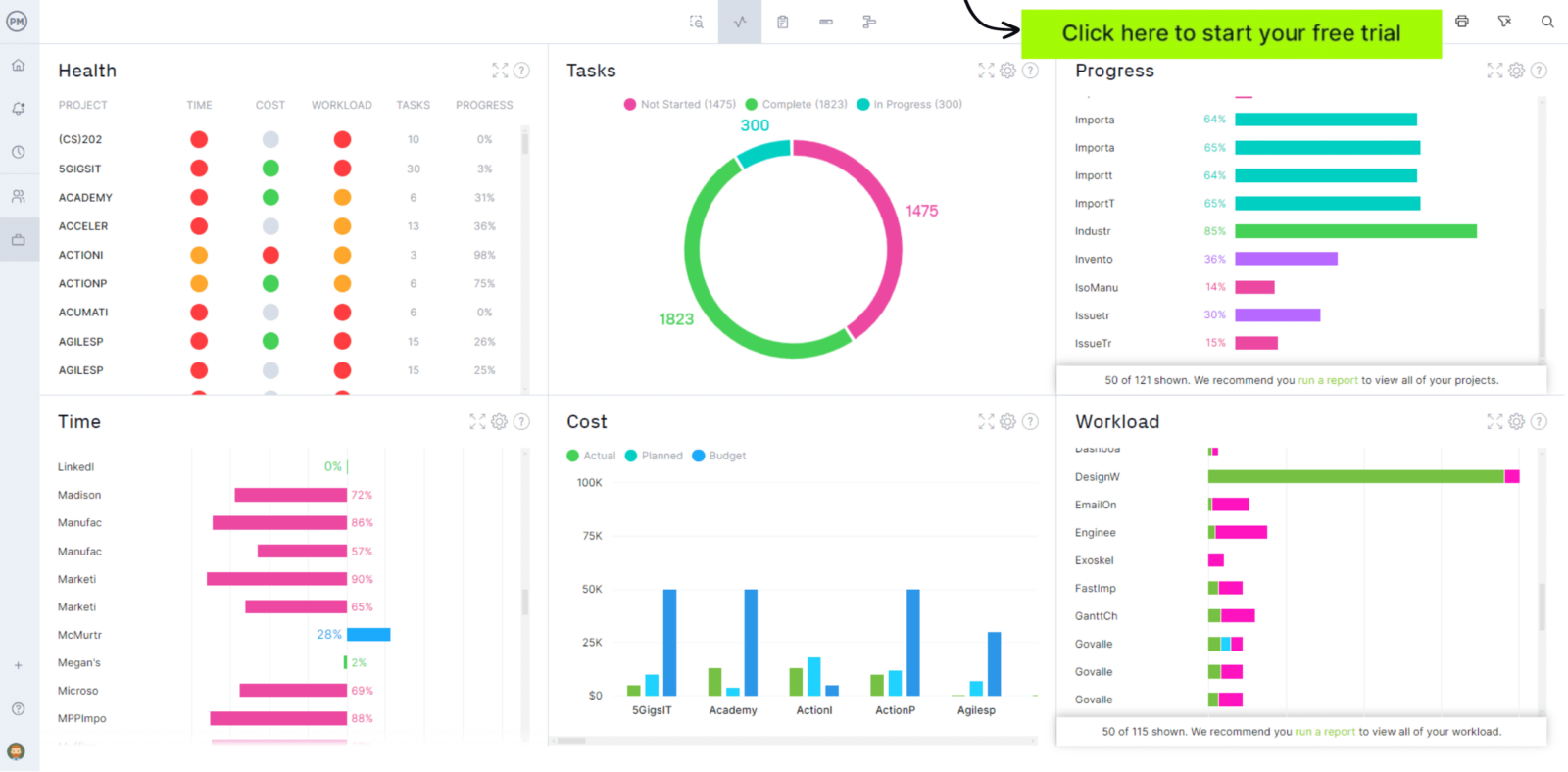
What Is a Program Manager?
A program manager is a project management professional who oversees the life cycle of a program. To do so, this person has to collaborate with project managers, portfolio managers, teams and stakeholders.
What Is a Project Manager?
A project manager is a project management professional who oversees the project life cycle. To do so, the project manager has to create a project plan, manage the team’s workload and keep track of project constraints.
Pro tip: Though not a program manager, the project manager has a lot to do with what’s happening on the program, such as delivering the project on time and within the allotted budget. It’s important not only to know the differences between the two roles but where they overlap.
Can a Program Manager and a Project Manager Work Together?
Absolutely! Program managers and project managers can effectively collaborate on projects, and this collaboration is usually paramount to the success of projects within a program. The program manager oversees multiple related projects, while the project manager is in charge of individual projects within the program. By working together, the program manager and the project manager can achieve better outcomes.
There are many benefits to these two roles collaborating with one another; it ensures that individual projects align with the larger goals of the program. It also benefits resource optimization as resources will be used efficiently across projects. Risk management is another benefit as this relationship allows for better risk identification and management, especially for those risks that could impact multiple projects. Finally, it improves stakeholder engagement by improving communication and reporting at all levels.
Multiple Project Tracking Template
This multiple project tracking template for Excel can help you track projects, programs and portfolios. The best part is that it allows you to zoom into the costs, progress, due dates and priority of all the tasks that make up each project.
We offer a variety of free PMO templates you can use to manage all aspects of your projects, programs and portfolios.
Program Manager vs. Project Manager: 10 Key Differences
Now that we’ve reviewed the roles of a program manager and a project manager, we can easily conclude how they’re different. Here are some of the main differences between them.
1. Job Description
While there are similarities and even overlaps between these two roles, the job descriptions of each better outline roles and responsibilities.
Program Manager Job Description
A program manager manages multiple projects and sometimes multiple programs while a project manager manages the teams responsible for fulfilling an individual project and achieving its deliverables.
Program managers have a “strategic mindset” while project managers have a more “operative” mindset. That’s because the program manager makes high-level resource management decisions that impact multiple projects while the project manager is only responsible for managing a single project at a granular level.
Programs are much longer in length and are more complex than a single project, so program managers will have a longer timeline to successfully deliver a program. On the other hand, project managers work on smaller projects, which are shorter in duration.
Project Manager Job Description
The project manager is responsible for planning, executing and closing projects following strict deadlines, all while staying within budget. This role coordinates efforts across team members and third-party contractors while overseeing all project aspects to ensure it meets the desired outcomes.
Typically, a project manager will have a Bachelor’s degree in a relevant field, and any extra certifications are a plus. Proficiency in project management software is ideal.
In addition to project planning and resource management, the project manager helps with budget and risk management. They also help with stakeholder communication and overall team leadership to help facilitate collaboration and quality assurance.
2. Responsibilities
While each program manager and project manager will have slightly different responsibilities depending on the company, here’s generally what you can expect.
Key Responsibilities of a Program Manager
- Overseeing multiple projects
- Managing multiple project teams (and sometimes project managers)
- Delivering successful program outcomes
- Overseeing the creation and execution of a program management plan
- Establishing a project selection and prioritization criteria
- Ensuring programs align with the strategic planning of their organization
- Allocating and scheduling resources across projects
- Collaborating with project managers, project management offices (PMOs), functional managers and the top management team to deliver programs successfully
- Participating in the project portfolio optimization process
Key Responsibilities of a Project Manager
- Managing the project constraints, including cost, time, scope, quality, risk and resources
- Assembling and managing the project team and their performance
- Delivering successful project outcomes (ensuring it is on time and under budget)
- Overseeing the creation and execution of a project management plan
- Report on project status to program managers, PMOs and project clients to ensure they’re progressing as planned
- Monitoring the workload of project team members
- Establishing project controls to monitor project health
- Managing project documentation
- Participating in the process of reviewing and approving project change order requests
3. Skills
Skills are another important consideration. Here are some top skills for program managers and project managers.
Top Program Manager Skills
- Communication skills: A project manager must interact with many people, including the project team members and stakeholders
- Leadership skills: A program manager must oversee the performance of several team members, such as project managers, project sponsors and key employees
- Project budgeting: A program manager must keep track of several project budgets
- Resource management: A program manager must be able to allocate, reallocate and keep track of program resources across projects
- Risk management: A program manager is responsible for the success or failure of a program. That’s why this role requires excellent risk management skills
Top Project Manager Skills
- Project scheduling: Project managers must be able to create realistic project schedules that support effective task, time and resource management
- Communication skills: Project managers must communicate with their teams and stakeholders on a permanent basis
- Negotiation skills: Project managers are the liaison between stakeholders and the project management team. It’s important that they can establish realistic goals and expectations
- Task management: Project managers must define the project scope, manage their team’s workload, set task dependencies and create a project schedule that fits all project activities
4. Education
Education for both a program and project manager plays a large role in their long-term success. Here’s what you can expect between the two roles.
Program Manager Education
In most cases, program managers require a bachelor’s degree in business, management or a related field such as business administration (MBA) or program management. Having advanced education helps equip program managers with the necessary resource management skills and strategic planning organizational leadership. Certifications like PgMP or MSP can help strengthen their understanding of program-level frameworks.
Project Manager Education
In terms of education, project managers usually need a bachelor’s degree in business, management or a related field such as IT, engineering or construction. This education offers foundational knowledge in communication, organizational skills and leadership, all of which are crucial for managing project teams.
5. Certifications
Program managers and project managers are both project management professionals, but their certifications are different.
Program Manager Certifications
Here are some common program manager certifications.
- Program Management Professional (PgMP): The Project Management Institute (PMI) offers this certification which focuses on managing multiple projects and aligning them with organizational strategy. It’s ideal for senior program managers who are focusing on strategic alignment, resource management and program integration.
- Portfolio Management Professional (PfMP): Another PMI certification, PfMP certifies professionals in managing multiple portfolios instead of individual projects or programs. It’s aimed toward aligning projects and programs with organizational strategy and prioritizing resources to get the maximum benefit.
- Managing Successful Programmes (MSP): AXELOS offers the MSP certification for managing complex and transformational programs. Topics include program governance, business case management and benefits realization.
- Certified SAFe Program Consultant (SPC): Scaled Agile offers this certification to help manage and coach agile program-level activities across Agile Release Trains (ARTs) within SAFe (Scaled Agile Framework). It’s suitable for those managing agile projects overseeing cross-team collaboration.
- P30 (Portfolio, Programme and Project Offices): AXELOS offers this certification that focuses on establishing and maintaining a centralized support structure for programs and portfolios.
Project Manager Certifications
Here are some common project manager certifications.
- Project Management Professional (PMP): The PMI offers this globally recognized certification that covers various project management methodologies, best practices and tools. It requires both an exam and project management experience.
- Certified Associate in Project Management (CAPM): Another PMI certification, CAPM is aimed at entry-level project managers who want to focus on fundamental project management principles and frameworks. This is a stepping stone toward more advanced certifications.
- PRINCE 2 Foundation and Practitioner: This is a widely used method, especially in Europe that emphasizes process-based project management using defined stages and roles.
- Certified Scrum Master (CSM): The Scrum Alliance offers CSM that certifies the foundational knowledge in scrum which is an agile framework. It’s popular in tech and software.
- Agile Certified Practitioner (PMI-ACP): This is a PMI certification that shows an advanced understanding of agile principles and techniques. It covers scrum, kanban and lean.
6. Salary
While salary can vary widely on location, here’s what you can expect as an average.
Program Manager Average Salary
“Program manager” is a general term that includes more specific job descriptions. We’ve broken down the salary expectations for each role.
- Program Analyst or Program Coordinator (Entry Level): According to ZipRecruiter, the average salary for a program coordinator is $48,503.
- Program Manager (Mid-Level): The average salary for a mid-level program manager is $55,328.
- Senior Program Manager or Program Director (Senior Level): The average senior program manager in the US makes $143,740 per year. The average senior program director earns $109,363 per year.
Project Manager Average Salary
Below are some average salaries for project management roles in the United States.
- Project Coordinator (Entry Level): Entry-level project coordinators make an average of $59,496 per year.
- Project Manager (Mid-Level): Mid-level project managers in the US make an average of $100,000.
- Senior Project Manager or Project Director (Senior Level): Senior project managers make an average of $126,253 per year while a senior-level project director makes an average of $110,936 per year.
7. Experience
Like any job, there is a range of expected experience levels that come with being both a program manager and a project manager.
Program Manager Experience
Program managers are usually expected to have 7-10 years of experience, and their previous roles should be in project or portfolio management. Ideally, they will have experience managing multiple, interdependent projects and expertise in stakeholder management, risk management and budgeting across projects.
Project Manager Experience
Project managers are usually required to have 305 years of experience in a management or project coordination role. They oversee end-to-end project lifecycles and are familiar with various project management methodologies including agile and waterfall. They should have skills in risk management, scheduling, budgeting and stakeholder communication. Many times, candidates have a PMP or another similar certification to demonstrate their proficiency.
Video: Difference Between a Program Manager and Project Manager Explained by a PMP
Want more information? Jennifer Bridges, PMP, further explains the difference between program manager vs. project manager below.
While the tools may be similar, the roles of a program manager and a project manager are different. Jennifer Bridges, PMP, explains the difference in this video.
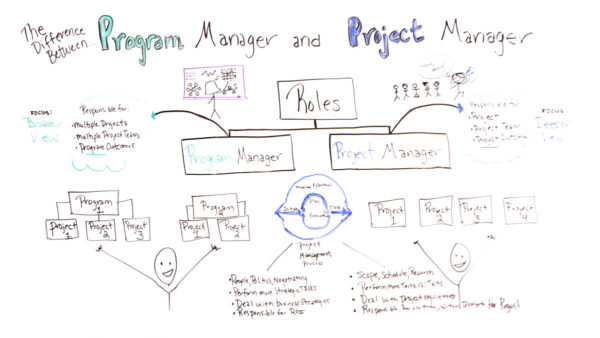
Related: How Program Managers Use Software to Manage Project Portfolios
Both Program Managers and Project Managers Use PPM Tools
Generally speaking, a program manager has broader responsibilities than a project manager. This means that the program management tools they use are focused on either the macro, for the program manager, or the micro, for the project manager.
But that doesn’t mean they need to use different tools altogether. Luckily, project portfolio management tools or PPM tools can be used by both program managers and project managers. Here are some examples:
ProjectManager Is the Ideal PPM Software for Both Program Managers and Project Managers
ProjectManager is a great tool for both program managers and project managers. It’s project management software that offers PPM tools such as Gantt charts, roadmaps, kanban boards, task lists and much more.
These tools are robust enough for PMOs or program managers and specific enough for project managers.
Gantt Charts and Roadmaps for Project and Program Management
ProjectManager’s Gantt chart can keep track of a signal project or act as a roadmap to help you manage multiple projects. You can use it to create a project timeline, assign tasks, manage your team’s workload and communicate with team members across projects in real time. It filters for the critical path and sets a baseline to capture your planned effort so you can track it against your actual effort and stay on schedule.
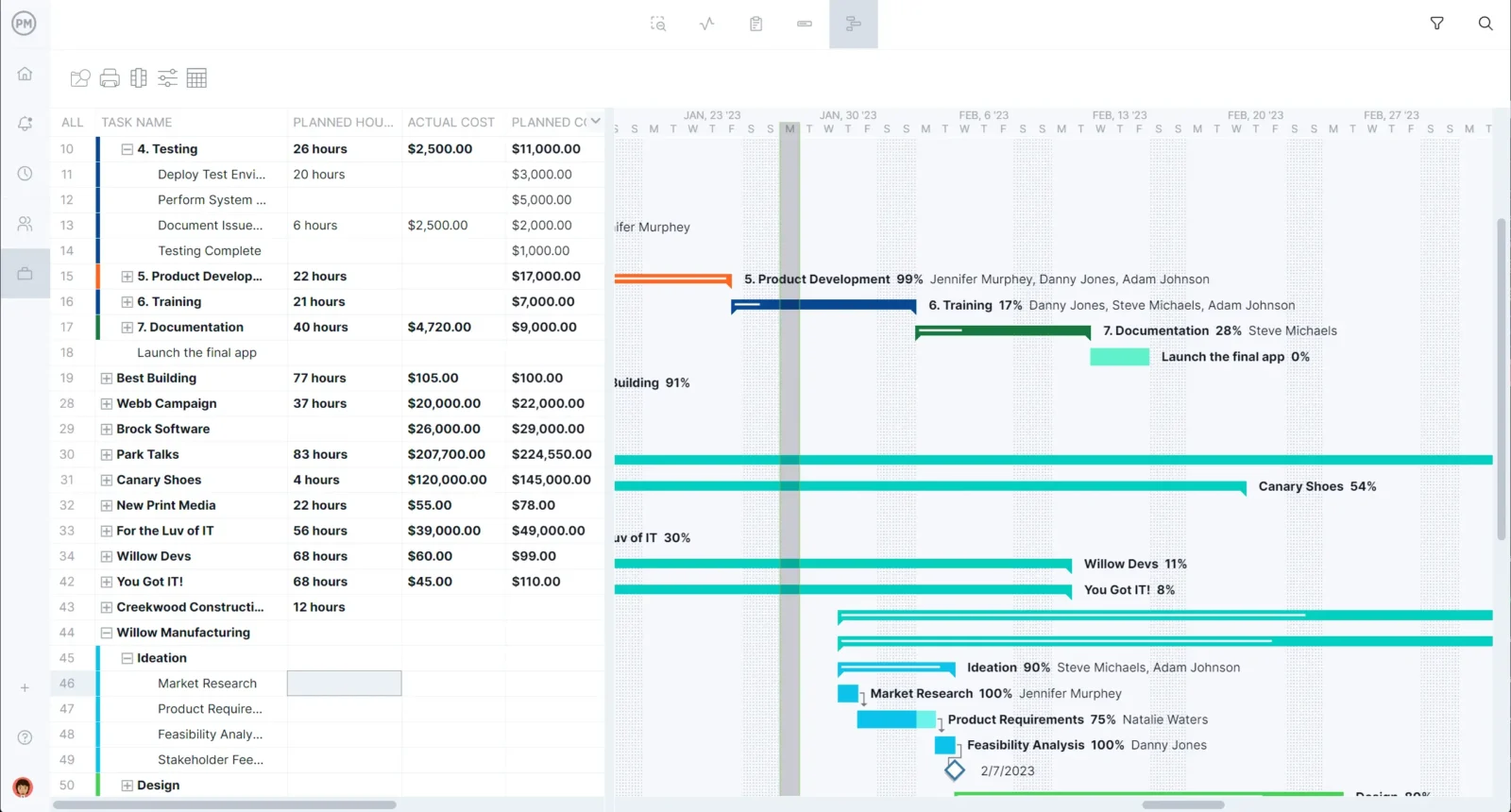
Project Portfolio Management Dashboards
Project portfolio management dashboards are the ideal tool for overseeing multiple projects at once. ProjectManager’s dashboards automatically compile the latest data across the software and make it easy to see what projects are ahead of or behind schedule. In a few clicks, filter the portfolio dashboard to see only the data you want to see to take action on specific projects as needed.
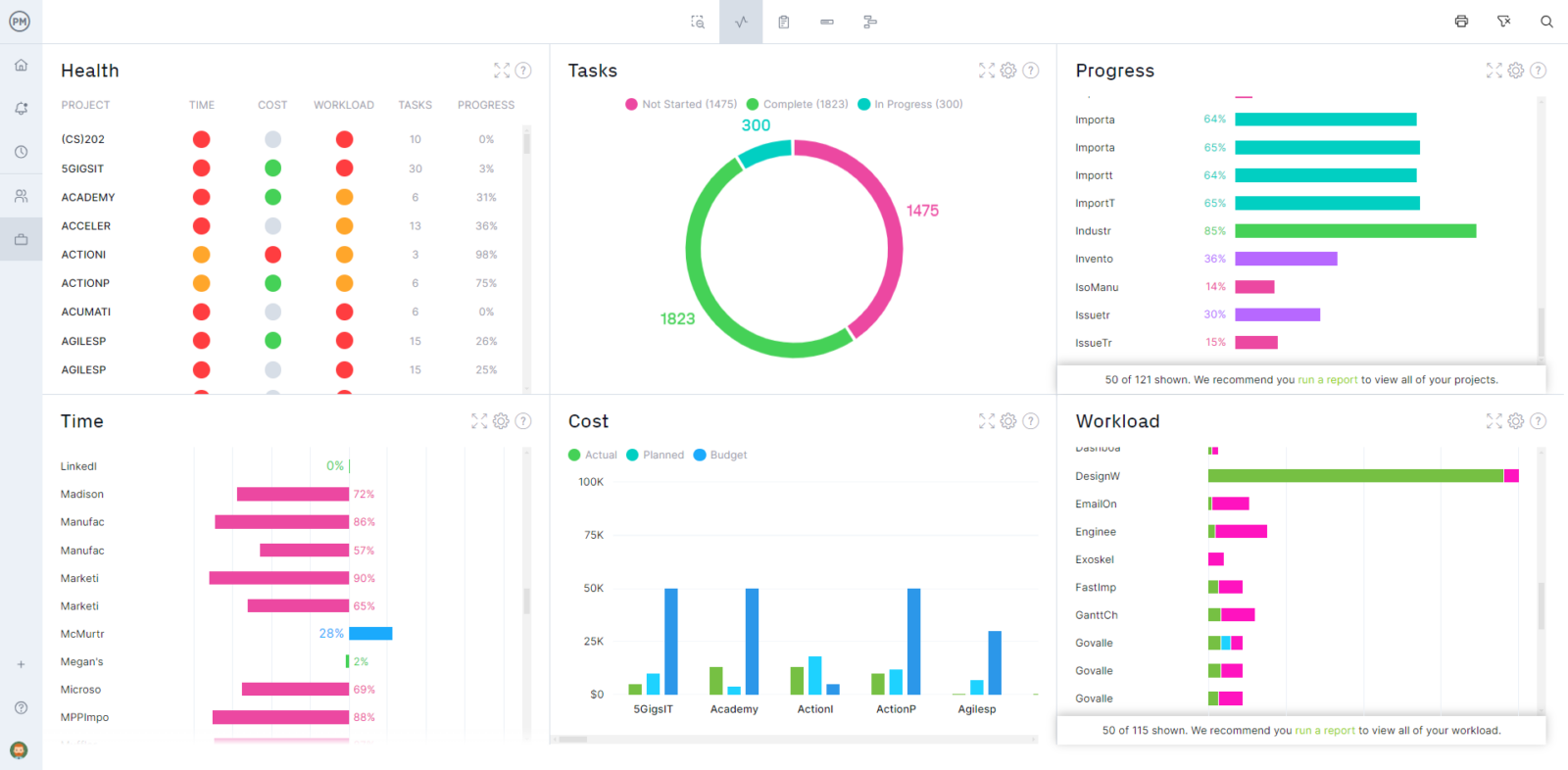
Real-time Reporting & File Sharing
ProjectManager offers unlimited file storage that allows program managers and project managers to generate project management reports in minutes and create a central hub for all project documentation. Simply create your project reports and share them with team members and stakeholders in real time. Every report is filterable to focus only on the data you want to see.
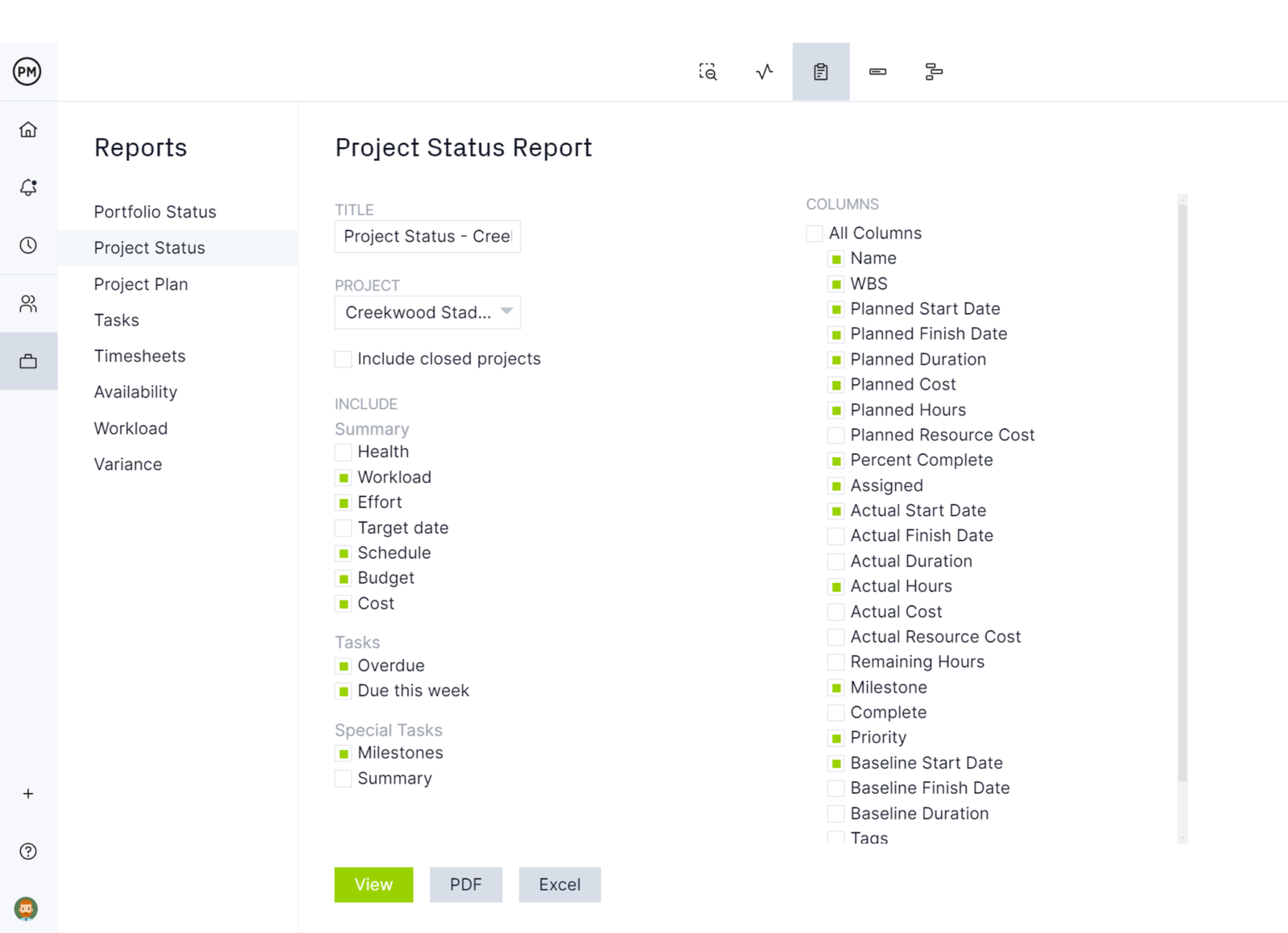
Related Content
- Project Prioritization for PPM (Matrix Included)
- How to Manage Multiple Projects: Strategies & Tools
- Project Management Office (PMO) – The Ultimate Guide
- Project portfolio management software
- Project Portfolio Manager Job Description
If you need a tool that can help you manage your project or your program, then sign up for our software now at ProjectManager.

